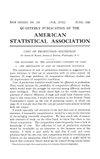A National Money Accounting as the Basis for Studies of Income Distribution
Quarterly Publications of the American Statistical Association
Pub Date : 1921-03-01
DOI:10.2307/2965316
引用次数: 0
Abstract
A recent writer has revived,f in very interesting fashion, an old dis? cussion as to whether man, as we know him, originated from solitary or from social progenitors. He argues, rather convincingly, from evidences of language and primitive customs, that the ancestors of man must have been highly socialized animals living much like the bee and the ant, and that the man-like apes represent side branches, or outlaws, from the evolutionary tree. This discussion, aside from its purely scientific interest, has its very practical aspects. We shall have one very definite attitude toward present day political evolution if we believe that society is developing from a primitive individualism toward a highly socialized form. And we shall have quite a different viewpoint if we see in human evolution a steady progression from a primitive and excessive socialism toward a scientific individualism which shall combine a large measure of per? sonal freedom of initiative with the advantages of collective effort, where collective effort is required. In the one case, the Marxian type of socialism represents at least a tendency toward progress; and in the other case, it represents economic infantilism, a mere atavistic recoil from economic growing pains. These two viewpoints are, in some respects, as widely separated as the poles. Yet they have common ground in an agreement that the ultimate test of any social or political plan must lie, first, in the gross production of the tangible and intangible things (goods, services, and gratifications) that satisfy normal and proper human desires; and, secondly, in the equalities and inequalities of the distribution of such gross production among individuals and families. Opinions may differ as to the relative weights that should be assigned to tangible and intangible products. They may differ, also, as to what uniformity of distribution is equitable or socially desirable, as to how far a diminution of the present inequality might increase production, and as to the extent to which gross volume of product should, if necessary, be sacrificed for the sake of such uniformity. But they must agree as to the vital need, from year to year, and from generation to generation, of国民货币核算作为收入分配研究的基础
最近有一位作家以一种非常有趣的方式,把一部古老的小说重新写了出来。关于我们所知道的人是起源于孤独的祖先还是来自社会的祖先的讨论。根据语言和原始习俗的证据,他相当有说服力地论证说,人类的祖先一定是高度社会化的动物,生活方式很像蜜蜂和蚂蚁,而类人猿代表了进化树上的分支,或者说不法之徒。这个讨论,除了纯粹的科学兴趣之外,还有其非常实际的方面。如果我们相信社会正从原始的个人主义向高度社会化的形式发展,我们就会对当今的政治演变有一种非常明确的态度。如果我们在人类进化中看到一种从原始的和过度的社会主义向科学的个人主义的稳步发展,这种个人主义将结合大量的个人主义,我们就会有完全不同的观点。在需要集体努力的地方,个人主动性的自由具有集体努力的优势。在一种情况下,马克思式的社会主义至少代表了一种进步的趋势;在另一种情况下,它代表了经济幼稚主义,仅仅是经济增长阵痛的返祖反应。在某些方面,这两种观点的差别就像两极一样大。然而,他们有一个共同点,那就是任何社会或政治计划的最终检验必须首先在于满足正常和适当的人类欲望的有形和无形的东西(商品、服务和满足)的总生产;其次,这种生产总值在个人和家庭之间分配的平等和不平等。对于应赋予有形产品和无形产品的相对权重,意见可能存在分歧。在分配的均一性在何种程度上是公平的或社会所期望的,在减少目前的不平等能在多大程度上增加生产,以及在必要时为了这种均一性应该牺牲多少生产总量等问题上,他们也可能存在分歧。但是他们必须同意,年复一年,一代又一代的迫切需要
本文章由计算机程序翻译,如有差异,请以英文原文为准。
求助全文
约1分钟内获得全文
求助全文

 求助内容:
求助内容: 应助结果提醒方式:
应助结果提醒方式:


